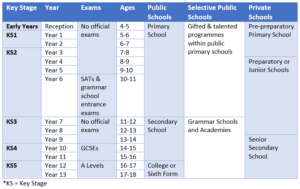Education in the United Kingdom: A Quick Guide
Education in the United Kingdom: A Quick Guide
The UK education system is known worldwide for its high quality and stringent standards, making it a popular destination for international families. The nation’s higher education system has six stages of compulsory education: early years, KS1 and KS2 (primary years), KS3 (lower secondary) KS4 (upper secondary) and KS5 (college). Full-time education is compulsory from the ages of five to 18, with a child beginning his or her formal education during the school year they turn five.
Although the United Kingdom is made up of four countries (England, Wales, Scotland and Northern Ireland), its education system is largely similar, so we can discuss its education as a whole.
I’ve created this useful table breaking down the stages of mandatory education, which I will discuss in further detail later in this blog – so keep reading!
Prior to Reception, children are entitled to 600 hours per year of optional state-funded education, e.g., nursery, playgroups or community groups. However, if you wish to enrol your child in a selective public school or private school, it is very important to start your search as soon as possible. The more competitive primary schools have lengthy waiting lists. Likewise, many selective or private secondary schools have waiting lists, so it’s best to be proactive when deciding your child’s education.
As you may have noticed, there are several important dates in your child’s education. At the end of primary school, there are exams which can determine which secondary school your child attends. Correspondingly, it is important that your child is well-prepared.
During secondary school your child’s education will become more rigorous – it decides whether your child succeeds academically and goes to university, or if they are more vocationally gifted and follow a practical, “hands-on route”.
The GCSE exams (General Certificate of Secondary Education) are a set of qualifications taken on or around your child’s sixteenth birthday. It refers to a two-year programme culminating in a set of exams. Taking your GCSEs is a crucial step to getting any form of paid employment or pursuing further studies. Whilst it is possible to find a job without completing GCSEs, it will be difficult, and it will seriously disadvantage you later in life. Mandatory GCSE subjects include Maths, English, Science, Computing, Physical Education and Computing. Some optional subjects are History, Languages and Geography.
Students over 16 typically study in sixth form, which is a historical term for Years 12 and 13. They will generally study Level-3 qualifications such as A-Levels, BTEC National Awards and level-3 NVQs, the latter two being vocational routes. If this does not suite the student’s learning style, they can pursue an apprenticeship or volunteering.
Advanced level qualifications (A Levels) can lead to university, further study, training or work. You will normally study three or more A levels over two years, which are usually assessed by a series of examinations. It’s a smart idea to choose A Levels related to your chosen degree or career path. For instance, if you want to study Engineering, you should choose Mathematics and Science related modules.
If this sounds like too much information to take in, don’t worry. TopCourses is here to help you find the best educational fit for your child. Whether you are already located in the UK or are thinking about moving or sending your child here, we are dedicated to helping you every step of the way. Together, we will discuss your needs, wants and goals. Then, we will present you with several schools in accordance with your budget, location and requirements. If you’re happy (which we assure you will be!), we’ll arrange in-person or virtual tours and take care of the enrolment process. Whatever you choose to do, we can help. Arrange your free initial consultation today.







